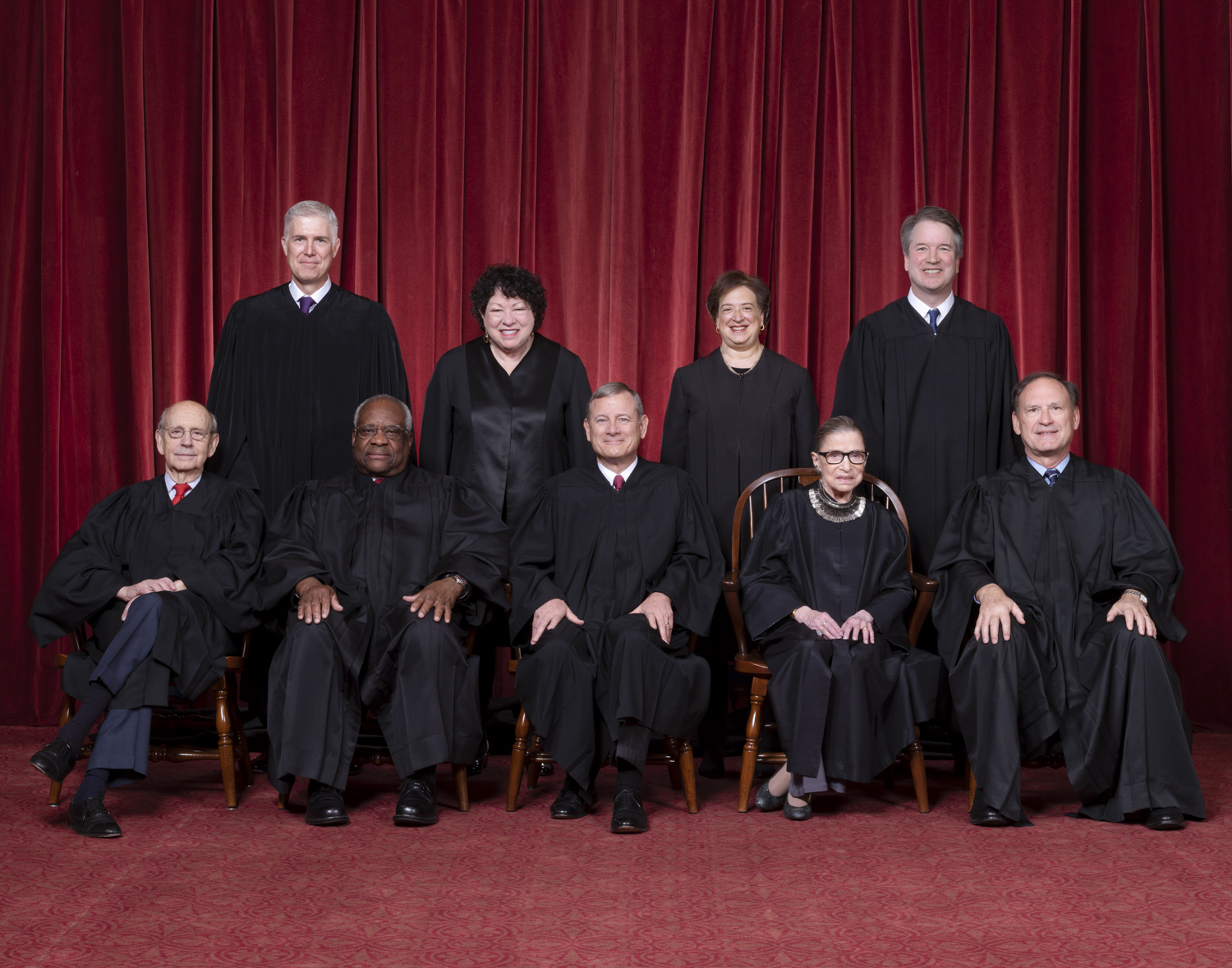 Arsenal Attorneys: A National Firm - Offices in Virginia and California
Arsenal Attorneys: A National Firm - Offices in Virginia and California
Arsenal Attorneys: A National Firm - Offices in Virginia and California
Arsenal Attorneys: A National Firm - Offices in Virginia and California
CONTACT US TODAY
800.819.0608
Displaying items by tag: supreme court
Summary of argument in New York State Rifle and Pistol Association v. Bruen
By George L. Lyon, Jr*
WASHINGTON, DC, NOV. 3, 2021: The Supreme Court today heard arguments in the case of New York State Rifle and Pistol Association v. Bruen. This case concerns the constitutionality of New York’s Sullivan law which requires applicants for an unrestricted pistol license to show “good cause,” defined as a special need for self-protection, distinct from the average person in their particular occupations. The law was previously upheld by the United States Court of Appeals for the Second Circuit. Former U.S. Solicitor General Paul Clement argued for the opponents of the law. New York’s Solicitor General and the Acting Solicitor General of the United States argued in support of the law.
Mr. Clement opened by stating that the Supreme Court’s 2008 Heller decision confirms the right of an individual, independent of service in a state militia, to both keep and to carry arms, that New York concedes there is a right to carry outside the home and that concession dooms the New York good cause requirement because it transforms a right into a mere privilege subject to the whims of governmental authorities.
The Justices’ questioning of counsel provided a fair degree of insight into how they are viewing the case. It was apparent from the questioning by Justices Breyer, Kagan, and Sotomayor that they see nothing constitutional infirm with New York’s good cause requirement. Although all the Justices seemed to agree that the court should look to text, history and tradition as at least an initial starting point in evaluating the case, there was not uniformity in terms of what historical periods should be most relevant to the court’s decision on this issue. Justice Thomas, for example, asked whether the founding period was most relevant or the period surrounding the adoption of the 14thAmendment, which the Court construes as having applied the Second Amendment to the several states. Mr. Clement’s response was that to the extent the history was in conflict, the period of the adoption of the 14thAmendment was most appropriate, but that here there is no such conflict. Mr. Clement would limit examination of history beyond those times as he said that the point is to look at the history that's relevant for understanding the original public meaning of the Second Amendment and the 14th Amendment.
Justice Breyer questioned whether the historical discussion in Heller was accurate but also suggested that the record in the case lacked sufficient data as to how New York is applying its good cause standard, in essence suggesting the court should remand the case for factual development. Mr. Clement responded that as to his two clients, there is no question how the good cause standard was applied because they were both denied unrestricted licenses for lack of good cause.
Justice Kagan observed that while Heller presumptively validated laws prohibiting felons and the mentally ill from possessing firearms, these laws were of relatively recent vintage, e.g., in the 1920s. Mr. Clement pointed out that at the founding, felonies were capital crimes, and also that regulations in the 20th century were to a large extent based on the collective rights theory that Heller rejected.
A theme of both New York and the United States as well as Justice Sotomayor was to suggest a robust history of firearms regulation in the nation. New York’s counsel also placed substantial reliance on the ancient Statute of Northampton and on 18th and 19th century surety laws to support restrictions on carrying arms outside the home. Mr. Clement pointed out that the Statute of Northampton has not been interpreted to prevent carrying arms except where one carries dangerous and unusual arms to terrorize the people. He further suggested that the surety laws New York referenced actually supported a right to carry arms in self-defense because such laws assumed the right to carry and only on complaint of an abuse of that right did they require a bond to keep the peace while still carrying.
Justice Alito who appears to have concluded that the good cause requirement is constitutionally infirm also called out New York for omitting the term “armed offensively” when citing a manual on the laws of North Carolina that appeared to call for the arrest of persons going armed. New York’s response was that firearms are inherently offensive. By the way, New York was not alone in making these types of omissions. Amici in support of New York made similar questionable omissions when quoting historical resources. Justice Alito also raised the question how scattered statutes or judicial decisions in the 19th and 20th centuries that are inconsistent with petitioners’ argument bear on the original intent of the Second Amendment.
It appears that Chief Justice Roberts shares Justice Alito’s skepticism with respect to the good cause requirement. Chief Justice Roberts suggested that Heller rather than Northampton should be the starting point.
This occurred in the context of another issue that merited substantial discussion, whether there should be a different rule for urban rather than rural areas. New York’s counsel argued that permits are more plentiful in rural areas of New York than in the more populated areas and that guns in populated areas create a greater risk of harm. Chief Justice Roberts pushed back against this line of argument. He said that Heller relied on the right of self-defense and that it is more likely that one would need a gun for self-defense in a populated area than in a rural area, pointing to high crime urban areas. “How many muggings happen in the woods?” he asked. He continued this line of inquiry and asked a hypothetical question about someone concerned about an active serial killer. New York’s counsel suggested that alone was not a sufficient reason to allow a citizen to carry outside the home for self-protection. Justice Kavanaugh picked up on that line and asked why isn’t it good enough to say you live in a violent area? New York’s counsel’s response can best be described as largely unresponsive to the question.
Justice Kavanaugh expressed concern that the discretion afforded licensing officials is inconsistent with the notion of a constitutional right. Justice Kagan stated that it seemed intuitive to her that there should be different gun regimes in New York versus Wyoming but stated that it is a hard concept to match with our notion of constitutional rights. She stated that the First Amendment would never allow such a distinction and asked for justification. Counsel’s response was that local conditions and concerns should dictate and that New York delegates the decision on license issuance to local officials.
The Justices seemed intent on examining the “sensitive places” issue which is not directly raised by the case. Chief Justice Roberts asked Mr. Clement whether universities could be off limits or places that serve alcohol. Mr. Clement responded yes to universities and that states could restrict consuming alcohol while carrying. Other Justices asked about sports stadiums, protests, subways, and special events. Justice Barrett asked about Times Square on New Year’s Eve. Mr. Clement suggested that as to particular places, the courts should look to historical analogs. He further likened sensitive places to the non-public forum doctrine in First Amendment law, basically a place where given its nature weapons would be out of place. Justice Alito suggested that a way to handle the sensitive places question would be to examine whether the state has taken alternative means to safeguard persons, for example, though use of metal detectors.
On balance it appears five votes exist to overturn the good reason requirement with Justice Barrett possibly a sixth vote.
Here is a link to the transcript of the argument on the Supreme Court’s website: https://www.supremecourt.gov/oral_arguments/argument_transcripts/2021/20-843_i4dk.pdf.
* Arsenal Attorneys is a nationwide law firm headquartered in Fairfax, Virginia in the metropolitan Washington, DC. The firm offers serves clients in over 30 states in estate planning, criminal defense, civil litigation, business law, landlord-tenant disputes, real estate, firearms law, restoration of rights, carry permits, and the firm’s proprietary Arsenal Gun Trust. Matthew Bergstrom is the firm’s Managing Attorney, and he is licensed in California, Michigan, Nevada, Virginia, and the District of Columbia. George Lyon is licensed to practice law in Virginia and the District of Columbia. He was one of the plaintiffs in Palmer v. District of Columbia which forced DC to begin issuing concealed carry licenses, and he was one of the initial plaintiffs in the US Supreme Court's landmark Second Amendment decision, Heller, which legalized handguns in Washington, DC. Mr. Lyon is licensed by the Metropolitan Police Department to teach the DC Concealed Carry License course including the renewal course and conducts the course monthly. Contact Mr. Lyon at gll[at]arsenalattorneys.com.
This blog is intended for informational purposes only and is not intended as legal advice.
US Supreme Court Both Rejects and Delays Possible 2nd Amendment Cases
By George L. Lyon, Jr, Esq.
As you may have heard the Supreme Court last week dismissed as moot the New York State Rifle and Pistol case that many had hoped would clarify for the lower courts the standard court should use to review second amendment cases. While not unexpected, the 6-3 decision was still a disappointment. Justice Alito wrote a dissenting opening which Justices Thomas and Gorsuch joined arguing that the case was not moot and that the city ordinance at issue was unconstitutional. In the penultimate paragraph of his opinion, Justice Alito made the following comment:
“We are told that the mode of review [by the lower courts] in this case is representative of the way Heller has been treated in the lower courts. If that is true, there is cause for concern.”
Supreme Court's Next 2nd Amendment Case: Giant Leap or Small Step?

By George L. Lyon, Jr, Esq.
Arsenal Attorneys is closely monitoring developments at the United States Supreme Court, which recently agreed to review a case some are already celebrating as a seminal 2nd Amendment decision in the making. However, this case, New York State Rifle and Pistol Association, Inc. v. City of New York, NY, might not have as broad and immediate an impact as many have predicted.
This case is highly anticipated because it would be the next logical step in a long, gradual process to recognize the liberties guaranteed by the 2nd Amendment, and thereby lead to the reversal of presumably unconstitutional gun control laws in states like California, New York, Maryland, etc.
Second Amendment jurisprudence has been the late bloomer of US constitutional law. Since its creation in 1789, the Supreme Court did not issue significant 2nd Amendment opinions until the last dozen years. In the McDonald v. Chicago decision in 2010, the Supreme Court explicitly stated that the Second Amendment’s right to keep and hear arms was a fundamental right applicable to the states via the 14th Amendment to the Constitution. The Court thus applied nationwide its 2008 decision in District of Columbia v. Heller that the Second Amendment includes the right to possess a functional firearm, including a handgun, in the home. Since that time, other than a summary reversal of a Massachusetts case upholding a ban on possession of stun guns as inconsistent with the Heller decision, the Supreme Court has not heard a gun rights case.
During this time, lower federal courts have upheld a variety of gun related legislation, including restrictions on the issuance of permits to carry handguns outside the home, magazine limits, and limits on so-called assault weapons. Until last week, the Supreme Court has declined to review these lower court decisions giving short shrift to the Second Amendment. Justice Thomas, dissenting from the Court’s refusal to hear one case, suggested the Court was treating the Second Amendment right to keep and bear arms as a disfavored right.
It may very well take another case to make it clear to the lower courts
that Second Amendment rights are not second-class rights.
Last week, however, the Court accepted for full argument the aforementioned case, New York State Rifle and Pistol Association, Inc. v. City of New York, NY. It involves a challenge to a New York City ordinance which restricts the right of city residents having pistol premises permits to take their guns out of their city homes. The New York ordinance only allows premises pistol licensees to take their guns to one of seven New York City gun ranges. Residents cannot take their handguns to a second home or a gun range outside the city. No other jurisdiction in the country has such a restrictive law.
The mainstream media, noting the presence of Justice Brett Kavanaugh replacing the more moderate Justice Anthony Kennedy, has been quick to suggest that the Court may now be ready to dismantle various gun control provisions, such as ‘may issue’ concealed carry laws and assault weapons bans.
Nothing would make us happier at Arsenal Attorneys than a far-reaching, strongly worded decision striking down the nonsensical New York City law and setting a rigorous test for evaluating restrictions nationwide on firearms and other self-defense tools. We predict, however, a more modest result. While we believe the New York City law is doomed, the Court may very well decide the case on narrow grounds. Supreme Court doctrine holds that courts should avoid deciding a Constitutional issue if the Court can decide a case on statutory grounds. Such a statutory ground exists for the Court to decide this case. A portion of the Gun Control Act, 18 U.S.C. Section 926A, states as follows:
Notwithstanding any other provision of any law or any rule or regulation of a State or any political subdivision thereof, any person who is not otherwise prohibited by this chapter from transporting, shipping, or receiving a firearm shall be entitled to transport a firearm for any lawful purpose from any place where he may lawfully possess and carry such firearm to any other place where he may lawfully possess and carry such firearm if, during such transportation the firearm is unloaded, and neither the firearm nor any ammunition being transported is readily accessible or is directly accessible from the passenger compartment of such transporting vehicle: Provided, That in the case of a vehicle without a compartment separate from the driver’s compartment the firearm or ammunition shall be contained in a locked container other than the glove compartment or console.
The New York City ordinance would appear in direct conflict with Section 926A. As such, the Supreme Court could very well throw out the provision on this statutory basis and avoid deciding the case on Second Amendment grounds. Such a result might very well obtain the support of the Court’s more liberal Justices, Ginsburg, Breyer, Sotomayor, and Kagan, with a resulting 9-0 decision invalidating the law. Likely, one or more of the Court’s more conservative Justices, Thomas, Alito, Gorsuch and Kavanaugh might pen a concurrence decrying the lack of respect shown the Second Amendment by the bulk of the lower Federal courts. Otherwise, Chief Justice Roberts may be the deciding vote whether to take a narrow or expansive path in invalidating the New York City law.
It may very well take another case to make it clear to the lower courts that Second Amendment rights are not second-class rights. A gun carry case could serve this purpose well, such as Rogers v. Grewal from New Jersey and now at the Supreme Court awaiting a decision whether it will be heard by the Supreme Court. The attorney generals of 23 states just asked the Court to review this case. For now, the Supreme Court’s taking New York Rifle and Pistol Association is clearly a good start, but it is likely just another gradual step in ensuring that the lower courts respect the Second Amendment.
Arsenal Attorneys’ George Lyon is licensed to practice law in Virginia and the District of Columbia. He was one of the plaintiffs in the Palmer v. District of Columbia case that forced DC to begin issuing concealed carry licenses and in the Heller case that legalized handguns in Washington, DC. Mr. Lyon is licensed by the Metropolitan Police Department to teach the DC concealed carry course and conducts the course monthly. His next class is scheduled for February 23-24 in Arlington, Virginia. To sign up for his course, contact Mr. Lyon at gll[at]arsenalattorneys.com or at 703-291-3312. Arsenal Attorneys is looking for persons who have obtained their DC concealed carry licenses and who would be willing to participate in a civil rights case relating to DC’s myriad of concealed carry restrictions. Contact Mr. Lyon if you have an interest in learning more.
CONTACT OUR FIRM
CONTACT US TODAY
Arsenal Attorneys is committed to answering your questions about estate planning, firearms, business law, litigation, and criminal defense issues.
We'll gladly discuss your case with you at your convenience. Contact us today to schedule an appointment.
LOCATION
4000 Legato RoadSuite 1100
Fairfax, VA 22033
800.819.0608











